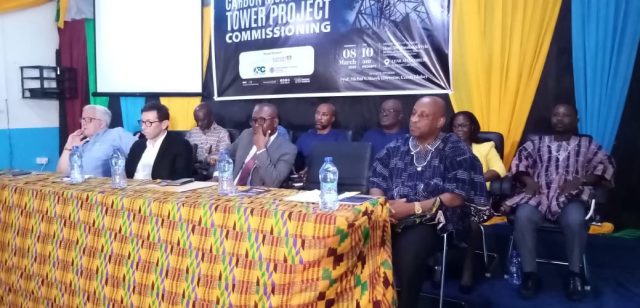Mr Jan Fury, the Czech Ambassador to Ghana, has inaugurated an international greenhouse gas monitoring and global change research station for the University of Energy and Natural Resources (UENR) in Sunyani.
The Bia Tano station is a joint scientific research project between UENR, the Global Change Research Institute of the Czech Republic (CzechGlobe) and other governmental institutions including the Forestry Commission of Ghana and the Forestry Research Institute of Ghana (FORIG).
It would be responsible for the direct measurements of forest-atmosphere exchanges of carbon dioxide, water, energy, and other trace gases that would allow for the University to observe the whole forest ecosystem metabolism (including soil measurements).
The station will further empower the university to quantify the role of forests as sources of trace gases, the input of gaseous pollutants and nutrients, and the role of the nation’s tropical forests in cleansing the atmosphere through carbon uptake from the atmosphere.
Mr Fury explained that the Czech embassy in Accra had operated for almost 70 years and had helped Ghana in many respective areas including the building industry, agriculture, and education.
He said the embassy after the COVID-19 had tried to re-calibrate its bilateral relations with Ghana, focused on security and defense, and agriculture, cyber security and infrastructure, saying the Embassy was working hard to introduce more Czech companies into the Ghanaian agriculture sector.
“We think that agriculture is an important sector of the Ghanaian economy which gives not only food, but also a lot of possibilities for the young people to be employed,” he said.
With the inauguration of the station, Mr Fury said Czech had opened up a new chapter in the environment, indicating “we believe that the environment is the engine of the future.”
“You have only one country and the air, the nature and the water you are having in your country is a key factor for the nations survival,” Mr Fury stated, and expressed the hope that the project would remain an excellent initiative to the University and inspire other Ghanaian universities and institutions.
Professor Elvis Asare-Bediako, the Vice Chancellor of the UENR expressed appreciation to the Embassy, the government, both CzechGlobe and its (University’s) entire local communities which had helped in diverse ways for the growth and development of the University.
He said though it was still one of the youngest public universities in the country, the University could boast of its tremendous contributions to scientific research and education since its establishment 10 years ago.
“The establishment of this international greenhouse gas monitoring station in the Bia Tano Forest reserve presents a huge potential to make progress in longstanding challenge of measuring and estimating the impact of extreme weather events on the carbon sequestration capacity in a typical tropical Ghanaian forest,” Prof Asare-Bediako indicated.
The project fits centrally within the University’s mission to promote and facilitate interdisciplinary research and education in water, disasters, energy, climate, agriculture, ecosystems, weather, health and biodiversity.
Prof. Asare-Bediako said there was the need for such scientific research studies to be conducted in the nation’s rich tropical forests, which had their own unique and specific forest biogeocenosis that differ both physiologically and ecologically from other tropical forests.
The UENR CzechGlobe joint research station is one of the few flux towers on the African continent to collect carbon flux data over a tropical primary forest, and the only one owned by a public funded university within the sub-Saharan African region to conduct such important research.
“Developing GHG emission and sink inventory at both national and regional scales within Africa is crucial to the United Nations Framework Convention on Climate Change (UNFCCC) in formulating and implementing comprehensive climate policies as an important metric for climate, energy and environmental sustainability,” he added.
The lack of such quality carbon flux data and vital information on the sequestration capacity of the African tropical forest ecosystems under varying climatic conditions makes it difficult for many countries like Ghana to accurately report on the challenges and successes of the Sustainable Development Goals 13 – Climate Action.
Consequently, Prof. Asare-Bediako said the research would further strengthen the underlying greenhouse gas inventory Management and measurement, Reporting and Verification systems of Ghana’s annual report to the Intergovernmental Panel on Climate Change by the Environmental Protection Agency and the Ministry of Environment, Science, Technology, and Innovation.
“Also, results from this project will support the government’s efforts in promoting sustainable forest management practices, conservation of forest biodiversity and increasing forest carbon stock as a way to regulate deforestation and provide access to funding opportunities from the Agriculture, Forestry and Other Land Use (AFOLU) carbon projects (such as the Reducing Emissions from Deforestation and Forest Degradation (REDD+)) to support national development”, he added.
Prof. Asare-Bediako said the University and Ghana remained grateful to CzechGlobe for its financial and technical support, saying as part of the existing Memorandum of Understanding between the two institutions, CzechGlobe had also donated a set of eddy-covariance systems and meteorological sensors valued at about $US200,000 for installation at the forest research site for long-term carbon flux measurement and monitoring.
They have also trained three of the staff in Ph.D. programmes and one technician to help manage the station when the project becomes fully operational and further contributed about $US30,000.
“We also received financial support of about 10,000 pounds sterling, which included a donation of some additional meteorological sensors from the Lancaster Environmental Centre of Lancaster University to be installed at the station”, he added.
The VC assured that the University remained committed to such international research partnerships, as “we also contributed financially (Gh¢400,000.00) to installing the 56m tower and supporting the expenses of our staff’s travel to get the station ready”.
Prof. Asare-Bediako appealed to the Ministry of Environment, Science, Technology, and Innovations to assist the University with both technical and financial support to manage the site.
“We also call on the Czech Embassy to support our scientific collaboration with CzechGlobe with a vehicle to help in the easy transportation of our technicians and scientists to the station regularly for maintenance and other operational activities.
The station is about three hours drive away from the University and such support will greatly be appreciated,” he added.








![Stonebwoy holds star-studded party for ‘5th Dimension’ mega album [Video]](https://ghananewss.com/storage/2023/04/stonebwoy-partyy-100x75.jpeg)








